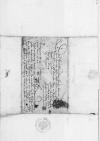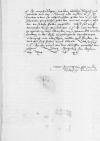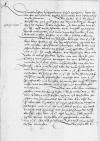Dem durchlauchten, hochgebornen fu[rsten] und herren, hern ⌊Albrechten⌋, von Gots g[nade]n marggraff zu ⌊Brandenburg⌋, / in ⌊Preussen⌋, zu ⌊Stettin⌋, / ⌊Pomern⌋, / d[er] ⌊[Cassu]ben⌋ und ⌊Wenden⌋ hertzog, / burg[graff] [zu] ⌊[Nu]rmberg⌋ und furst zu ⌊Rugen⌋, / [unserm] hochgunstigen, lieben herren und freund[t] /
Wir haben Ewer Furstlichen Durchlaucht zwene ⌊⌋, den XXV und XXVI dits monats datum zu ⌊Konigsberg⌋, bei diesem botten gestrigs tages erhalten,/ in dem ersten uns Ewer Furstliche Durchlaucht uff unser ⌊⌋, / unser cantzlei und eigner handt, antworten, / und dovor unnottig dancken, / so wir uns vil meher zuthun Ewer Furstlichen Durchlaucht schuldig erkennen. /
Was das ausschiffen belangt, / das Ewer Furstliche Durchlaucht kein korn habern etc. dis jar abzufuren, / es were dan aus ⌊Litten⌋, / ⌊Lifflandt⌋, / ⌊Samayten⌋ / ader ⌊Polen⌋, / mit scheinlichem beweis angezeigt, / wil gestatten, / wolle wir Ewer Furstlichen Durchlaucht nicht bergen, / das dergleichen korn aus Polen in etlich hundert lasten, / wie wir bericht, / gen ⌊Elbing⌋ wirt gefurt, / derwegen ⌊die vom Elbing⌋ vormeinen, in so freÿ zu sein auszuschiffen, / wie ⌊den von Dantzk⌋. / Es mussen sich aber des unser ⌊underthane von Braunsberg⌋, / wie wirs mitt Ewer Furstlichen Durchlaucht vorlassen, / enthalten, / bissolange, das Ewer Furstliche Durchlaucht ⌊underthanen⌋ solche ausfure werde zugelassen, / welchs uns, / wie Ewer Furstlichen Durchlaucht schreiben mit bringen, / zu seiner zeit an zu kundigen nicht wirt vorbleiben, / und solchs mit danckbarheit annehmen. /
Das wir aber kein meldung gethan, was die ⌊koniglichen rethe⌋ neben uns in ⌊der vom Elbing⌋ ausschiffen gesynt, / ist derhalben gescheen, / das wir samptlich den edlen, ernvhesten hern ⌊dantzker castellan⌋ uf negst gehaltener ⌊tagefart⌋ gebethen, / mit Ewer Furstlichen Durchlaucht mundtlich und in die weite dorauss, / und nemlich was die schlissung des tieffs betrifft, / eher dan ⌊koniglicher maiestet⌋, unserm aller gnedigisten herren, derhalben sol geschrieben werden, / mit Ewer Furstlichen Durchlaucht sich zubereden, / doruff wirs auch lassen beruehen. /
Wie sich aber Ewer Furstliche Durchlaucht entschuldigen, / das kein beladen schiff mit getreide von der ⌊Mymel⌋ ader andern Ewer Furstlichen Durchlaucht landes ortern sei abgelauffen, / geben wir Ewer Furstlichen Durchlaucht schreiben gentzlichen glauben, / und vil mehern also den, / die solchs haben angeben. / Es sal auch derwegen unser gemuet gen Ewer Furstliche Durchlaucht, wie die uns ermanet, / in dem kleinsten nicht gewandelt werden, / sondern in der bahn angefangener trewhertziger meynung / mit vleissigem willen und dinsten stet und fest sich halten unnd bleiben. Des sol sich Ewer Furstliche Durchlaucht, der gunst wir uns bevelhen, / gentzlich vorsehenn.



